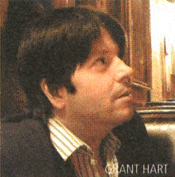

 |
GRANT
HART
Good News for Modern Man (PACHYDERM) Records with Grant Hart's name on them have been few and far between since the breakup of Hüsker Dü a dozen years ago, a real surprise considering how prolific he was in the Minneapolis trio. When Bob Mould went on to greater suc- cess in Sugar, Hart's compelling solo album Intolerance and work with the band Nova | |
|
Mob were overlooked, perhaps because
Hüsker fans weren't ready for the
keyboards and oblique themes their hero was exploring. But after guest- ing on Patti Smith's Gung Ho, Hart returns with Good News which is just that. The writer of many of Hüsker Dü's finest songs lets his great pop instincts roam, from the opener "Think It Over" to the Beach Boys-meets-Dick-Dale "Run Run Run to the Centre Pompidou" and the swirling stomp of "Nobody Rides for Free." Playing every instrument himself (aside from one guest) and building a massive sound, Hart has made a tour de force that shows he remembers what a rush live music can be. And in quieter moments, like "You Don't Have to Tell Me Now," he shows he can still write classic songs. | ||
 |
PULSE: Why so long between
albums? HART: Well, there was a band in between there (Nova Mob). And then this one I started recording this in '97; and spent a good deal of time on it, so that explains part of the time. But you know, I was never really in such a hurry. PULSE: Were you happy with Intolerance? HART: It's well crafted enough, though there was practically no budget to make it | |
|
with at the time. Unfortunately, things have to be paid for in this business.
Studio time is one of them. That was a good album for what it was. PULSE: Are you happier with the new album? HART: Yeah, I would have to say that anything else that I've made up until this point there are certain little things that you go, 'Oh, I should have done that there,' or 'This could have been a cross-fade into that.' And judging by that criteria I have less things that I would go in and change on this one than anything I've been involved in. PULSE: How would you assess your career at this point? HART: I've been able to keep music as the only source of support since I was 17 years old, so going on 21 years now. And that is quite surprising when you look back on it and go, 'Wow!" Particularly with Hüsker, the breakup of that left the three members kind of in the emotional state that they were in when the band started. You're kind of looking around and you're a 26-year-old high school grad- uate, it's like getting free, shaking off whatever shackles but also having to look forward to what the next solution's going to be. Life doesn't end when the con- tract's up, you know? PULSE: Did time heal the wounds left by Hüsker Dü's breakup? HART: There's the ripples in the pond still that are, to me, it's almost amus- ing in its pettiness. ... a lot of situations where I might have a record coming out and different people in the press would be like, "Oh, we'd do a review on it, except that we just wrote up Bob's album last month. And we pretty well cov- ered the ex-Hüsker bases.' ... People want to take sides in what they perceive to be a feud. The important thing for me is: Do a good job artistically. From that point on, be nice to people, put on a good show, do your work, let the people that notice it appreciate it, let the people that love it appreciate it more. For example, Nixon could have done much better without an enemies list. PULSE: What's Hüsker bassist Greg Norton doing now? HART: Greg Norton is getting ready to cook a meal for my band and Patti's when she's in town next week. He is running a—I would definitely give it at least four stars— restaurant in Red Wing, Minn., where he has lived for the past 15 years or so. I saw him pursuing music and I was just thinking, 'God, people are just using him for his name and not taking on any of his ideas.' He got out of it and started going to differ- ent schools for cooking, and really lays an extra special plate. —PETER MELTON | ||